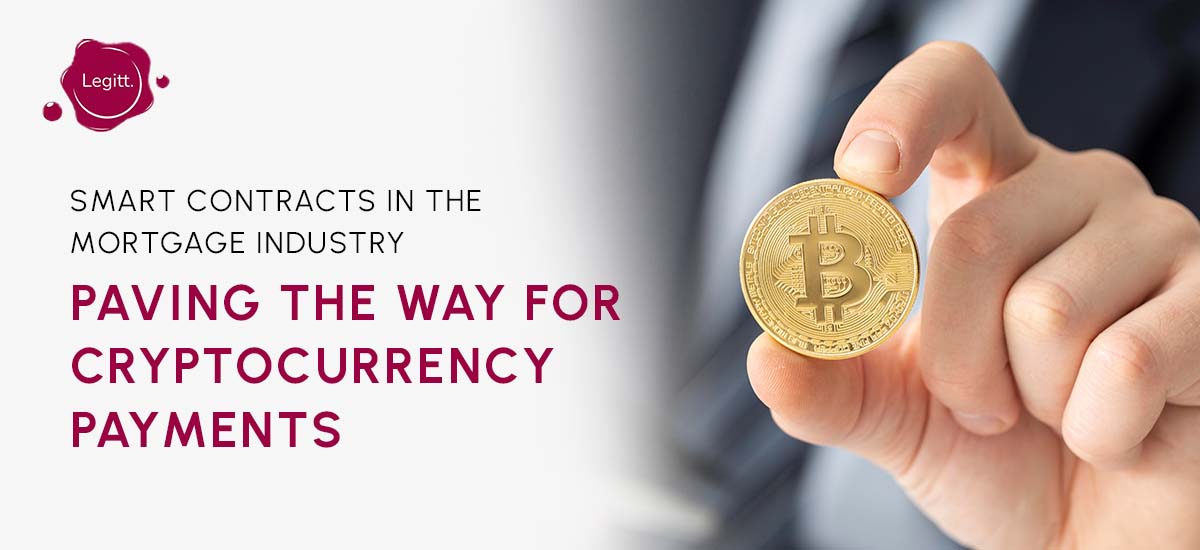In recent years, the rapid rise of cryptocurrencies and blockchain technology has spurred innovative thinking across multiple sectors. One such realm is the mortgage industry, which has always been viewed as a cornerstone of financial systems around the world. Historically bound by paperwork, multi-step verification processes, and a lack of transparency in certain aspects, the mortgage industry stands to benefit immensely from blockchain’s smart contracts. More specifically, it opens up the possibility of enabling payments in cryptocurrency from customers. Here’s a closer look at how this could be achieved.
The Concept of Smart Contracts
A smart contract, at its core, is a self-executing contract with the terms of the agreement between buyer and seller being directly written into code. They are stored on a blockchain, ensuring their transparency and tamper-proof nature. Smart contracts automatically enforce and verify all aspects of a contract, eliminating the need for intermediaries and significantly reducing the possibility of fraud.
Also Read: Smart Contracts on Blockchain
Enabling Cryptocurrency Payments in Mortgages
Trust and Security: The decentralized nature of blockchain technology ensures that all transactions are transparent and tamper-proof. This builds trust among participants. When a customer makes a payment using cryptocurrency, the transaction is recorded on the blockchain, ensuring both parties can verify and confirm the payment.
Efficiency and Cost-effectiveness: Cryptocurrency transactions are processed without the need for banks or third-party intermediaries, making transactions quicker and often cheaper. In the mortgage industry, this could lead to faster payment processing and lower transaction fees.
Global Reach: Cryptocurrency has a universal value. By enabling payments in cryptocurrency, mortgage providers can tap into a global market of potential customers who prefer crypto over traditional payment methods.
Flexibility and Choice: As more people invest in and hold various cryptocurrencies, offering the option to pay mortgages using crypto provides customers with greater flexibility and choice in how they manage their assets.
Also Read: What can contract management software ensure
Considerations and Challenges
While the benefits are apparent, there are challenges to overcome:
Volatility: Cryptocurrencies can be extremely volatile. Mortgage providers need strategies in place to either convert crypto payments to a stable currency quickly or hedge against potential value fluctuations.
Regulatory Landscape: The regulatory environment around cryptocurrency is still evolving. Mortgage providers would need to navigate this landscape carefully to ensure compliance.
Integration with Existing Systems: Traditional mortgage systems might not readily support cryptocurrency payments, necessitating upgrades or integrations.
Also Read: What is CLM tool
The Role of Smart Contracts
Smart contracts can play a crucial role in facilitating cryptocurrency payments for mortgages:
Automated Verification: Once a payment is made using cryptocurrency, the smart contract can automatically verify the payment, update the loan balance, and adjust any relevant terms based on the payment.
Dynamic Adjustments: Given the volatility of cryptocurrencies, smart contracts can be designed to dynamically adjust terms if a particular cryptocurrency’s value fluctuates beyond agreed thresholds.
Transparent Record-Keeping: Every payment made and every term adjustment can be recorded transparently on the blockchain, accessible by all relevant parties.
Also Read: Contract administration vs contract management
Legitt AI: Turning Contracts into Smart Contracts
Incorporating smart contracts into the mortgage industry isn’t just about creating new contracts; it’s about converting existing contracts into smart ones. This is where Legitt AI can revolutionize the process.
Legitt AI, with its cutting-edge technology, can seamlessly convert traditional mortgage contracts into smart contracts. These digital contracts can then be managed on the blockchain, ensuring security, transparency, and the full array of benefits that come with smart contracts.
Moreover, Legitt AI can provide an interface where customers can easily make their mortgage payments in cryptocurrency. The platform’s intuitive design can handle the intricacies of cryptocurrency transactions, ensuring smooth and hassle-free payments for both the customer and the mortgage provider.
The marriage of smart contracts and the mortgage industry offers a future where transactions are secure, efficient, and transparent. By embracing blockchain technology and enabling cryptocurrency payments, the mortgage industry can not only enhance customer experience but also pioneer a new era in real estate finance. With tools like Legitt AI, transitioning to this new era becomes not a question of “if” but “when.”
Did you find this Legitt article worthwhile? More engaging blogs about smart contracts on the blockchain, contract management software and electronic signatures can be found in the Legitt Blogs section. You may also contact Legitt to hire the best contract lifecycle management services and solutions along with free contract templates.
FAQs about Smart Contracts in Mortgage Industry
What are smart contracts?
Smart contracts are self-executing contracts with terms directly coded into them. They're stored on blockchains, ensuring transparency and automatic enforcement without intermediaries.
How do smart contracts ensure security in mortgage payments?
Being on a blockchain, smart contracts are tamper-proof and transparent. They automatically verify transactions, eliminating fraud chances and making every payment detail accessible to involved parties.
What advantages do cryptocurrency payments offer in mortgages?
Cryptocurrency payments enhance trust, reduce transaction costs, offer global reach, and provide customers with greater flexibility in managing their assets.
Are there challenges in adopting cryptocurrency for mortgage payments?
Yes, challenges include cryptocurrency's volatility, an evolving regulatory landscape, and the need to integrate crypto payments with existing mortgage systems.
How can smart contracts handle cryptocurrency's volatility
Smart contracts can dynamically adjust mortgage terms based on cryptocurrency value fluctuations, ensuring both parties remain protected in volatile market conditions.
What role does Legitt AI play in this process?
Legitt AI converts traditional mortgage contracts into smart contracts, manages them on the blockchain, and provides an interface for customers to make cryptocurrency payments seamlessly.
Is every cryptocurrency transaction using smart contracts recorded?
Yes, all transactions made via smart contracts are transparently recorded on the blockchain, making them verifiable and accessible to all relevant parties.
How does the integration of smart contracts benefit mortgage providers?
Smart contracts streamline verification, ensure transparent record-keeping, and enable dynamic adjustments to loan terms, making processes more efficient and secure for mortgage providers.
